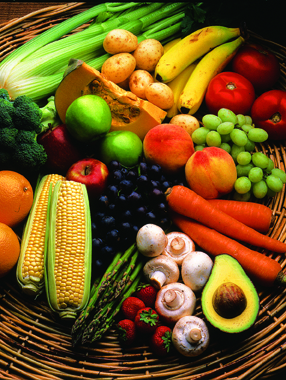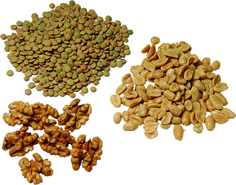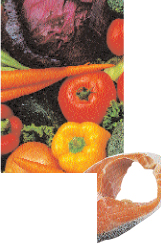Feminine caring foods
A balanced diet is the key stone for good health. Increasing consumption of essential fatty acids and the amounts of vitamins and minerals in the daily diet may help to relieve many of the discomforts suffered by women.

+ The following foods should be found in a healthy feminine diet.
∎ Soy. And a number of derivatives containing vegetable estrogens that can reduce the risk of heart diseases, osteoporosis and female cancers. Calcium enriched soy products are the best choice.
∎ Dairy products. Low-fat milk, yogurt and reduced fat cheeses are high in calcium and help to reduce the risk of osteoporosis after menopause. Because calcium is found in the liquid part of milk, extracting fat from dairy products doesn't reduce the mineral content.
∎ Whole foods. Rich in insoluble fiber, breads and whole grains are basic low fat sources of energy that reduce the risk of breast and uterine cancer. They also help to prevent colon cancer, flushing the intestines and improving waste flow.
∎ Berries. Rich in fito-nutrients, red, black and blueberries help to strengthen collagen production, the artery walls and the proteins that make up the skin's structure and volume. Help to reverse visible signs of aging.
∎ Fish, dried fruits and seeds. Rich in essential fatty-acids, necessary for keeping the cells hydra ted (lack of these essential fatty-acids can cause the skin to dry out). Ocean fish are rich in iron that the body can absorb easily.
∎ Lean red meat. Reduces the risk of anaemia and provides minerals that are necessary for the health of the reproductive system.
FIGHTING CANDIDIASIS
Candida albicans is a yeast present in the intestines and in general doesn't have any adverse effects. It only becomes a problem when it grows rapidly and excessively. This can occur in the intestine and in the vagina, but also in the mouth and throat. The most important key in preventing it, is to strengthen the immune system. You may want to try the following foods:

- • Garlic, which helps to prevent viral, bacterial and yeast infections, increasing the resistance of the immune system.
- • Foods rich in zinc such as red meat, fish, dried fruits, seeds and dairy products, especially yogurt.
- • Fruit drinks that contain "probiotic” bacteria that help to restore the balance of microorganisms in the intestines that keep candida under control. Yogurt is also good.
- • Iron rich foods, like lentils. An iron deficiency can induce the growth of candida.
- • Grapefruit seed extract, called “citricidal” is recommended to treat candidiasis for its powerful anti-mycotic effects and its ability to keep intact beneficial bacteria inside the intestines.

It's also advised to avoid excess sugar which can create a stock pool for candida to feed on. Diabetics tend to suffer from this vaginal yeast infection regularly.

NOTE
You should always consult your doctor before changing your diet.
∎ Beets. Rich in foliate (folic acid), reducing the risk of spinal defects in babies and low levels of red blood cells in the blood.
∎ Pears. Help to reduce cholesterol and regulate sugar levels in the blood.
∎ Eggplant. High in antioxidants and helps to reduce high levels of cholesterol, it also helps to protect the brain.
∎ Chickpeas. Rich in isoflavones that help to reduce the risk of cancers related to hormones and relieve menopause symptoms.
∎ Flax seeds. Rich in fatty acids that can help to relieve PMS.
∎ Avocado. Rich in vitamin E, a necessary vitamin for the skin's health.
∎ Black currants. Rich in vitamin C and a rich source of antioxidants. Reduce the risk of certain cancers and strengthen the immune system.
∎ Garlic. High in fito nutrients and anti mycotic activity. Good for preventing and treating candidiasis.
SUGAR, NUMBER ONE ENEMY

Women's great enemy is sugar. Often, in the face of fatigue, tiredness or depression we feel an impulse to eat sweets but the end effect of eating sugars is a drop in blood sugar levels, making us feel more tired or increase depression. This is also generated by the hormonal mechanism: when we eat sweets the pancreas reacts to the increase of sugar in the blood and releases a large amount of insulin. This causes a rapid decline in blood sugar levels and produces hypoglycemia. What is the consequence? Increased fatigue, tiredness and depression. It is important especially during your menstrual periods to keep a balanced level of sugar in the blood. It is recommended during menstruation, when you feel tired or have an irresistible craving to eat something sweet, eat some honey. At the same time excess refined sugar modifies the pH in the stomach, which is why the body when trying to balance alkaline levels, takes calcium from the bones, decreasing bone's mineral density.
FOR PREVENTING BREAST CANCER
Breast cancer can be caused by a number of factors.
However, eating a healthy diet is one of the key variables in preventing and reducing the risk of breast cancer. A nutritional guide has been put together to help prevent breast cancer. It's important to reduce your intake of animal fat present in foods such as butter, creams, dairy products, deli meats, sausages, fatty meats and poultry skin. It's important to eat fresh, raw fruits and vegetables that can benefit the intestinal walls, prevent constipation, an important factor in reducing the risk of any health problem.
In the case of cancer, a healthy intestinal wall increases the body's defenses and stops the cells from mutating. Fiber plays a key role in preventing cancer, flushing out free radicals and the detoxification of many xenobiotics that when they come into contact with the intestinal mucous can cause dangerous mutations. This is why whole foods included in the diet can be extremely helpful.

KEY NUTRITION

- • Eat raw fruit and vegetables daily to increase your intake of fibers.
- • Decrease fatty meats and whole milk dairy products.
- • Eat soy at least two times per week, to replace meat. You can eat soybeans or derived products (burgers, tofu, soy milk, miso and many other products), preferably organic.
- • Increase the amount of beans and flaxseed in your diet. They contain phytoestrogens that reduce the risk of many discomforts caused by the hormonal metabolism.
- • Make sure to eat many antioxidant rich foods and to eat plenty of fresh foods and stay away from processed fast foods.

Comment about this article, ask questions, or add new information about this topic: